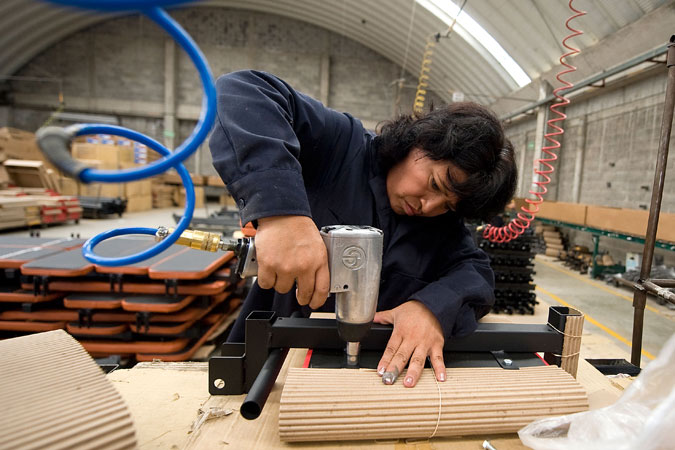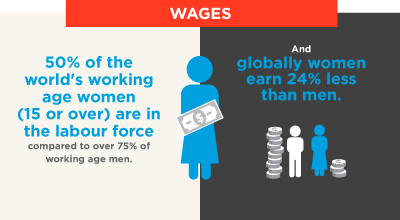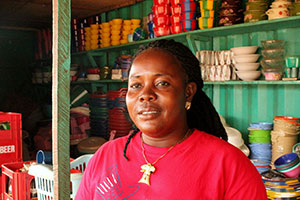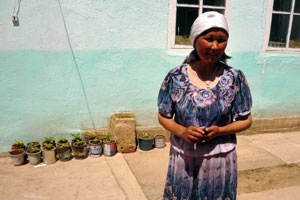SDG 8: Promote sustained, inclusive and sustainable economic growth, full and productive employment and decent work for all

Targets
- By 2030, achieve full and productive employment and decent work for all women and men, including for young people and persons with disabilities, and equal pay for work of equal value.
- Protect labour rights and promote safe and secure working environments for all workers, including migrant workers, in particular women migrants, and those in precarious employment.
- Take immediate and effective measures to eradicate forced labour, end modern slavery and human trafficking and secure the prohibition and elimination of the worst forms of child labour, including recruitment and use of child soldiers, and by 2025 end child labour in all its forms.
- Sustain per capita economic growth in accordance with national circumstances and, in particular, at least 7 per cent gross domestic product growth per annum in the least developed countries.
- Achieve higher levels of economic productivity through diversification, technological upgrading and innovation, including through a focus on high-value-added and labour-intensive sectors.
- Promote development-oriented policies that support productive activities, decent job creation, entrepreneurship, creativity and innovation, and encourage the formalization and growth of micro-, small- and medium-sized enterprises, including through access to financial services.
- Improve progressively, through 2030, global resource efficiency in consumption and production and endeavour to decouple economic growth from environmental degradation, in accordance with the 10-year framework of programmes on sustainable consumption and production, with developed countries taking the lead.
- By 2020, substantially reduce the proportion of youth not in employment, education or training.
- By 2030, devise and implement policies to promote sustainable tourism that creates jobs and promotes local culture and products.
- Strengthen the capacity of domestic financial institutions to encourage and expand access to banking, insurance and financial services for all.
- Increase Aid for Trade support for developing countries, in particular least developed countries, including through the Enhanced Integrated Framework for Trade-Related Technical Assistance to Least Developed Countries.
- By 2020, develop and operationalize a global strategy for youth employment and implement the Global Jobs Pact of the International Labour Organization.
An inclusive, sustainable economy fosters growth with benefits for all. It does not harm the environment, and uses resources judiciously so they will remain for generations to come. For many people, employment is the entry point for economic well-being. In an inclusive economy, decent work means a living wage, workplace safety and protection against discrimination.

There has been some progress. Twenty years ago 40 per cent of women were engaged in wage and salaried employment; today 48 per cent of women are being paid wages. Yet, globally, women still work at lower rates than men [1]. Gender stereotypes often define what is ‘women’s work’, and can channel women into some of the worst jobs. Among 143 countries, at least 90 per cent have some legal restriction on women’s employment [2].
When economies are geared towards achieving women’s rights and gender equality, the benefits, such as fairer societies and greater economic dynamism, accrue to everyone. Women must have equal access to decent work, productive resources and financial services, as well as an equal voice in economic decisions.
UN Women prioritizes economic rights and growth for all. This includes advocating for legislation on equal pay for equal work, better access to employment opportunities, safety from sexual harassment in the workplace, and other critical rights. The organization promotes women’s ability to secure decent jobs, accumulate assets, and influence institutions and public policies determining growth and development. It seeks to measure and redistribute women’s unpaid care work, and to take actions so women and men can more readily combine it with paid employment. UN Women also engages the private sector to create equal opportunities for women at work, in the marketplace, and in the board rooms, through the Women’s Empowerment Principles.
Stories
“My business is expanding my world”
A comprehensive programme to promote women’s literacy, business skills, entrepreneurship and savings, is transforming the lives of over 20,000 rural women in Liberia.
With sewing and sowing, self-reliance blooms in Central Asia
Thanks to a regional programme, families of migrant labourers in Kyrgyzstan and Tajikistan are receiving training, resources and micro-credit loans to become self-reliant entrepreneurs. More than 520,000 migrant workers and their families have benefitted from a wide range of services. The programme also promotes policy development and dialogue on migration.
Notes
[1] UN Women (2015), Progress of the World’s Women 2015-2016: Transforming economies, realizing rights, Chapter 4, p. 199.
[2] World Bank (2014), Women, Business and Law 2014: Removing Restrictions to Enhance Gender Equality, p. 8.

